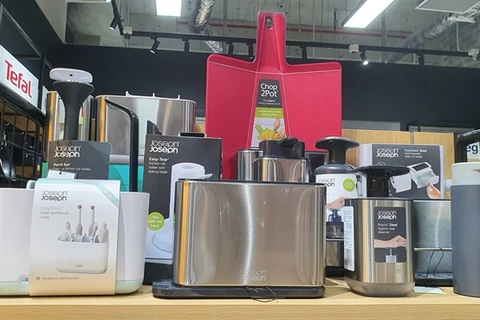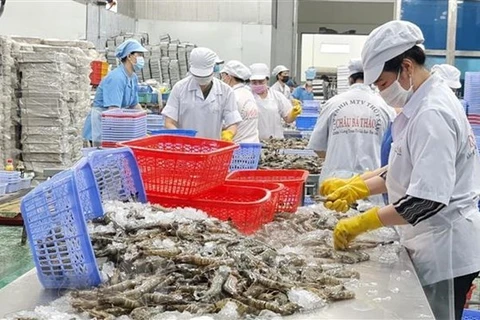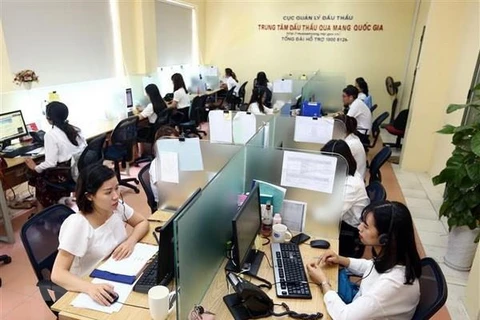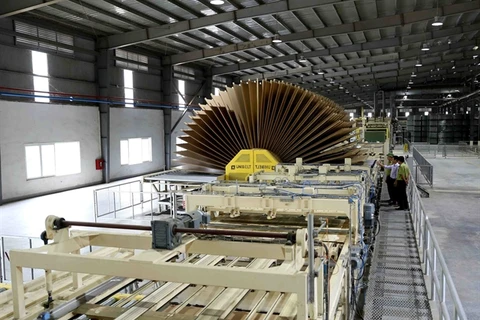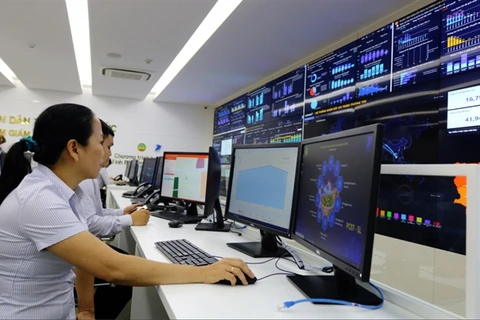Hanoi (VNS/VNA) - The UK-Vietnam Free Trade Agreement (UKVFTA) has given a big push to Vietnamese exports, but insiders said firms still have much to do to make the most of the deal.
Nguyen Thi Thu Trang, Director of the Centre for WTO and International Trade (CWIT) at the Vietnam Chamber of Commerce and Industry (VCCI), told Vietnam News that the preferential tariffs under the UKVFTA require strict compliance with its rules of origin, which stipulate the chief part of the materials used in the manufacture of exports originate from its members.
For firms highly dependent on materials imported from non-members, it is not easy to be eligible for favourable tariffs unless they reconfigure their supply chains to adapt to the rules.
“Noncompliant firms do not forfeit their entrance to the UK market, but they are ineligible for preferential tariff,” she said.
Trade data shows that in 2021 exports covered by Certificates of Origin issued under the UKVFTA took up roughly 17.2% of the total Vietnamese exports to the UK, far lower than the average figure under other FTAs (about 32.7%).
The director also underscored UKVFTA as a new-generation agreement that sets the bar high for intellectual property and demands novel competition and labour standards commitments.
Vietnamese firms, accordingly, must incur higher compliance costs and go through more complicated procedures to expand their commercial presence in the UK.
It is also worth noting that the UKVFTA has given Vietnamese products a tariff advantage over other products. Unfortunately, the advantage is not permanent and will change once the UK enters FTAs with other countries.
Given the risk of stiffer competition from new UK-initiated FTAs, it is advisable for Vietnamese firms to quickly seize the trade opportunity to keep themselves well-positioned against future competitors.
“They should not take the UKVFTA for granted but rather take full advantage of the deal to consolidate their position before new rivals move in quickly,” she said.
The director urged firms to study the agreement in more depth to gain a full insight into its impacts on their operation, thereby being operationally prepared for the changing trade patterns.
She also called for competitiveness enhancement strategies, which are not just for show but functional, to improve firms’ competitive positions in the short-term to make full use of the agreement.
Dang Hoàng Giang, General Secretary of the Vietnam Cashew Association, told Vietnam News that the tariffs on intensively-processed cashew were slashed from around 5 and 7% to 0% on the grounds of the UKVFTA.
Notably, Vietnam exported 18,000 tonnes of cashew to the UK in 2021, equivalent to an export revenue of 104 million USD.
As the UK was an EU member, its Sanitary and Phytosanitary Measure and Technical Barriers to Trade are, so far, not fundamentally different from other European countries.
UK importers prefer high-quality organic products from internationally-recognised manufacturers, including BRC-certified and SMETA-certified ones.
They also require fair trade, gender equality, a sense of community responsibility and many other ethical frameworks.
“For UK firms, which are highly disciplined and rule-compliant, trade fraud and contractual violations are intolerable. Fraudsters and violators are normally called defaulters,” he said.
The general secretary is concerned that Vietnam comes lower than the Netherlands on the list of top intensively-processed cashew exporters to the UK even though the Netherlands is not a cashew producer.
“The Netherlands imports cashew nuts from Vietnam, intensively process the nuts and re-exports them to the UK. The country was the fourth largest importer of Vietnamese cashew in 2021,” he said.
The Netherlands ranked first on the list, and imported 11% of Vietnam’s cashew output last year, indicating that Vietnamese firms have not fully leveraged the deal to unlock their potential. There is ample room for improvement.
The general secretary recommended firms keep well-informed about UK’s Technical Barriers to Trade and other similar regulations to penetrate the market more easily.
Contact with Vietnamese trade offices and the Vietnamese Embassy in the UK are equally helpful since they will help firms with trade information.
Firms are also recommended to commercially join forces to become less dependent on offshore materials, thereby elevating the content of domestic materials in their exports to rules-of-origin-specified levels.
He also underscored strict compliance to contractual terms and up-to-UK-standard products as the key to firms gaining ground in the market.
The UKVFTA was signed on December 29, 2020, and temporarily came into effect on December 31, 2020, before officially starting on May 1, 2022.
Negotiated based on the principles of inheriting commitments in the EU-Vietnam Free Trade Agreement, the deal facilitates commercial flows between the two countries through its almost across-the-board tariff cuts.
The trade data of the CWIT shows that annual bilateral trade grew by 17.2% just one year after the agreement. Vietnam’s exports to the UK hit 5.8 billion USD in 2021, up 16.4% year-on-year.
In the first six months of 2022, the figure reached 2.9 billion USD, up 1.1% from the same period last year./.
Nguyen Thi Thu Trang, Director of the Centre for WTO and International Trade (CWIT) at the Vietnam Chamber of Commerce and Industry (VCCI), told Vietnam News that the preferential tariffs under the UKVFTA require strict compliance with its rules of origin, which stipulate the chief part of the materials used in the manufacture of exports originate from its members.
For firms highly dependent on materials imported from non-members, it is not easy to be eligible for favourable tariffs unless they reconfigure their supply chains to adapt to the rules.
“Noncompliant firms do not forfeit their entrance to the UK market, but they are ineligible for preferential tariff,” she said.
Trade data shows that in 2021 exports covered by Certificates of Origin issued under the UKVFTA took up roughly 17.2% of the total Vietnamese exports to the UK, far lower than the average figure under other FTAs (about 32.7%).
The director also underscored UKVFTA as a new-generation agreement that sets the bar high for intellectual property and demands novel competition and labour standards commitments.
Vietnamese firms, accordingly, must incur higher compliance costs and go through more complicated procedures to expand their commercial presence in the UK.
It is also worth noting that the UKVFTA has given Vietnamese products a tariff advantage over other products. Unfortunately, the advantage is not permanent and will change once the UK enters FTAs with other countries.
Given the risk of stiffer competition from new UK-initiated FTAs, it is advisable for Vietnamese firms to quickly seize the trade opportunity to keep themselves well-positioned against future competitors.
“They should not take the UKVFTA for granted but rather take full advantage of the deal to consolidate their position before new rivals move in quickly,” she said.
The director urged firms to study the agreement in more depth to gain a full insight into its impacts on their operation, thereby being operationally prepared for the changing trade patterns.
She also called for competitiveness enhancement strategies, which are not just for show but functional, to improve firms’ competitive positions in the short-term to make full use of the agreement.
Dang Hoàng Giang, General Secretary of the Vietnam Cashew Association, told Vietnam News that the tariffs on intensively-processed cashew were slashed from around 5 and 7% to 0% on the grounds of the UKVFTA.
Notably, Vietnam exported 18,000 tonnes of cashew to the UK in 2021, equivalent to an export revenue of 104 million USD.
As the UK was an EU member, its Sanitary and Phytosanitary Measure and Technical Barriers to Trade are, so far, not fundamentally different from other European countries.
UK importers prefer high-quality organic products from internationally-recognised manufacturers, including BRC-certified and SMETA-certified ones.
They also require fair trade, gender equality, a sense of community responsibility and many other ethical frameworks.
“For UK firms, which are highly disciplined and rule-compliant, trade fraud and contractual violations are intolerable. Fraudsters and violators are normally called defaulters,” he said.
The general secretary is concerned that Vietnam comes lower than the Netherlands on the list of top intensively-processed cashew exporters to the UK even though the Netherlands is not a cashew producer.
“The Netherlands imports cashew nuts from Vietnam, intensively process the nuts and re-exports them to the UK. The country was the fourth largest importer of Vietnamese cashew in 2021,” he said.
The Netherlands ranked first on the list, and imported 11% of Vietnam’s cashew output last year, indicating that Vietnamese firms have not fully leveraged the deal to unlock their potential. There is ample room for improvement.
The general secretary recommended firms keep well-informed about UK’s Technical Barriers to Trade and other similar regulations to penetrate the market more easily.
Contact with Vietnamese trade offices and the Vietnamese Embassy in the UK are equally helpful since they will help firms with trade information.
Firms are also recommended to commercially join forces to become less dependent on offshore materials, thereby elevating the content of domestic materials in their exports to rules-of-origin-specified levels.
He also underscored strict compliance to contractual terms and up-to-UK-standard products as the key to firms gaining ground in the market.
The UKVFTA was signed on December 29, 2020, and temporarily came into effect on December 31, 2020, before officially starting on May 1, 2022.
Negotiated based on the principles of inheriting commitments in the EU-Vietnam Free Trade Agreement, the deal facilitates commercial flows between the two countries through its almost across-the-board tariff cuts.
The trade data of the CWIT shows that annual bilateral trade grew by 17.2% just one year after the agreement. Vietnam’s exports to the UK hit 5.8 billion USD in 2021, up 16.4% year-on-year.
In the first six months of 2022, the figure reached 2.9 billion USD, up 1.1% from the same period last year./.
VNA

